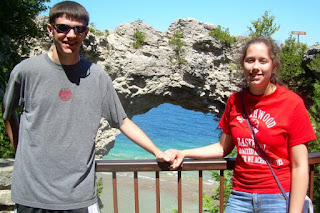If you are still reading this post - not shying away from the words "Life Update" in anticipation of boredom - then thank you for caring. I am aware that many people read this blog who may perhaps be more interested in my doings and well-being than in my wandering musings.
It is true that I had a "rough" year at school last year - which is a nice way of saying that I didn't do very well. But because I am convinced that I can do better, I am returning this fall semester to give it the old college try again. I hope I am more determined than I was last year to succeed. Nevertheless, your prayers are cherished.
My parents are trying to sell the house. Usually people ask where my parents want to move to, and I usually say they want to find an apartment somewhere in Kalamazoo (our current home), but they're not too worried about finding a new place yet. They're just waiting for the house to sell.
My mom helps out with youth fund-raising at church, and puts much effort into this service. My sister and I are very proud of her for this.
 My sister has a boyfriend - his name is Corey. [Yes, that's him to the left; not me.] She first met him on a mission trip. She liked him because she felt comfortable talking to him. I think this is still the case. Oh, I forgot: my crafty, scheming sister got up the nerve to play paintball with him before they started dating as a means to win his heart. I think they always play on the same team, to avoid inter-couple combat. You see, now my sister likes the sport. What's a brother to do? . . .
My sister has a boyfriend - his name is Corey. [Yes, that's him to the left; not me.] She first met him on a mission trip. She liked him because she felt comfortable talking to him. I think this is still the case. Oh, I forgot: my crafty, scheming sister got up the nerve to play paintball with him before they started dating as a means to win his heart. I think they always play on the same team, to avoid inter-couple combat. You see, now my sister likes the sport. What's a brother to do? . . .I'm currently in love with the sweet tunes of this band: Rodeo Ruby Love; and of my friend Frank Schweikhardt's solo material. I am also waiting to receive in the mail Paul Simon's newest release, "Surprise," at the behest of my good friend Burke (who is also starting a new band: Owlsburg. I can't wait to hear them!).
This summer I was too lazy and asocial, somewhat unintentionally. So if you live in Kalamazoo, I am sorry that we didn't see each other more often this summer. It was my fault. Please forgive me. Along with being asocial came staying inside the house too much. Every time I go outside I appreciate the wind . . . moving air, not restricted by four walls or windows. I believe God did a much better job creating than we did in modifying our environment.
On the bright side, I did do a bit of reading - mostly by John Howard Yoder (a Christian pacifist with convincing arguments) and N.T. Wright (a prolific New Testament scholar who is now the bishop of Durham, England). Many of the books I read this summer I've listed to the right under Books I Read.
This summer I also attended youth group as a sponsor at my church, where we talked about the 10 commandments. Thanks to Pastor Kevin for very insightful teaching!
[As I write this they are moving a house up our street - which is quite a sight. This has been frustrating, though, because they are about 10 days late from the original date. They said there would be chance of power-outage for 4 hours on our block during the move. They postponed the move date about three times without formal notice. So, because my mom works at a computer at home and couldn't risk working during a power outage, she had to work very early in the morning at least three times in vain on days when they didn't move the house. Bleh.]
These are the courses I hope to take this semester (which begins next Tuesday), all of which are 3 hours long, totaling 12 credit hours:
- Homiletics I (preaching)
- Patristic Theology (reading the early church fathers)
- Church History I (the New Testament to Martin Luther)
- Beginning Greek Independent Study
Right now I am trying to pack for school, which is proving to be interesting. I have a lot of things I am leaving at home, and just a few things I'm taking, which makes the task deceiving. I cannot judge my success by how clean or empty my room is. Rather, I have to check and re-check my list and my brain for what I intend to bring, and what's not yet packed.
A good number of my friends have graduated and now live off-campus (Joe, Dave, Dusty&Natalie, Adam&Becky, Chris &Joyce, Burke, and a few others). This will mean many a phone call and bike ride to see them (although it's always nice to get off-campus). However, I can always lure them in with free meal swipes (this works quite well, actually, at attracting friends to campus - free food).
All kidding aside, I cannot wait to return to Marion on Saturday, so that I may see my friends and start the semester off strong.
Please do keep in touch, friends. You can write me at the following addresses:
hand-written (preferred):
Scott Hendricks
IWU 825 Student Ctr.
Marion, IN 46953
email: shoot[insert my first name here, no brackets]anemail@gmail.com
Peace to you all, and stay strong.